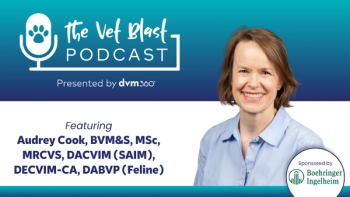
- dvm360 May 2024
- Volume 55
- Issue 5
- Pages: 48
Veterinary medicine and substance use

A clinical look at a common concern
In a world of uncertainty, one thing we can be sure of is that veterinary medicine has inherent stressors. These include long hours, a deep sense of responsibility to patients, rising demands for services, a shortage of veterinarians, difficult conversations with clients about costs and billing, intensive procedures, life-and-death decisions, and humane euthanasia.
However, it is not as though this stress magically abates when you leave your practice at the end of your shift. Working in a profession that demands absolute excellence day after day often leaves little time and energy to be present when you finally get home. Engagement with partners, children, companion animals, and personal responsibilities such as medical appointments or grocery shopping unintentionally get pushed to the back burner.
I have been a clinical psychologist and facilitator with Not One More Vet’s (NOMV) Veterinary Mental Health Support for 4 years, and the professionals I counsel and work with share their worries with me.
A severe mental and emotional toll can occur when you are doing your best to continuously manage all of these stressors. Many individuals turn to substances to help them cope, and there is a strong link between high-stress jobs and substance use. Furthermore, chronic stress can lead to increased motivation for using addictive substances.1-3 Please know that when I use the term substance use in this article, it encompasses alcohol, cannabis, illicit drugs, and the overuse/misuse of over-the-counter and prescription medicines.
It’s understandable why we may attempt to ameliorate our stress with substances. First, they are convenient and often socially acceptable ways to substantially alter a mental state, and they work almost instantaneously. They provide a rush of dopamine, a neurotransmitter associated with pleasure and satisfaction, which can produce a sense of euphoria while simultaneously delivering a numbing effect. Substances can help silence the incessant and ruminative thoughts or placate emotional and physical pain.
Coping with stress through substance use can rapidly turn problematic, however. This discussion becomes even more complex when considering the causes, processes, and variables of addiction, and determining what usage is ultimately harmful to the user.
When substance use becomes problematic
There is significant research linking various genes to a predisposition to substance addiction.4 Relatedly, we know that having family members who with an addiction is a risk factor cross-generationally, meaning if we have related loved ones who have had problems with substances, we may have a susceptibility we need to be aware of. Furthermore, there is a documented comorbidity between a substance use disorder and other mental health diagnoses, including anxiety, depression, and posttraumatic stress disorder.5
There are distinct theories on the development of a substance use disorder, including Anna Lembke, MD, and her dopamine theory,6,7 as well as self-medication theory.8 Lembke suggests that addiction, including substances and behaviors (such as technology use), is regulated by the brain’s dopamine system. Dopamine can be excessively stimulated by alcohol and drug use, leading the user to crave these feelings.7 As a result, they will seek out the means to reproduce them quickly and effectively. Lembke’s perspective also emphasizes the role of being in a stressful environment, such as the constant stimulation and urgency of a veterinary hospital or practice, and the urge to immediately soothe.7 This requires a dependence on outside sources to maintain dopamine levels because the brain eventually loses the capacity to produce an effective amount on its own.
The self-medication theory posits that individuals turn to addictive substances and/or behaviors to cope with underlying psychological concerns and mental health disorders.8 According to this theory, substances are used to alleviate symptoms of anxiety, depression, or trauma (diagnosed or not). The more an individual relies on substances to deal with their pain, the more anesthetic one needs over time. The individual’s tolerance increases, potentially leading to dependency on those substances for relief.8
The contrast between these theories revolves around determining the primary mechanisms that drive addiction: Is it the result of overstimulation of the brain’s reward system by outside influences and a desire to achieve and maintain this state? Or is it a physiological process where individuals who use substances to treat their ailments may ultimately become dependent on them?
Examining substance use from a behavioral perspective
When I first meet an individual seeking treatment for substance use, I begin by evaluating its impact on their daily life. My hope is to create a safe space to have an honest assessment while hearing your thoughts and feelings about your related behaviors. Although a thorough clinical intervention would also examine the frequency of use in the context of the Diagnostic and Statistical Manual of Mental Disorders (Fifth Edition) criteria, the reason for asking these questions should never be to shame the patient; rather, and most importantly, it’s to communicate that there is effective help—and hope.
There are a variety of professional treatment options available, depending on the acuity of the need and want to change behaviors. These range from enrolling in peer support programs such as those offered by NOMV, attending anonymous support groups such as Alcoholics Anonymous or Narcotics Anonymous, working with licensed clinicians in an outpatient therapy setting, participating in partial hospitalization day programs, or committing to a full-time residential program. Once you are in treatment, together you and your team can decide on the appropriate medications and strategies.
In conclusion, substance use should be evaluated on an individual case basis, especially for veterinary medicine professionals. Finding the correct balance for you should feel authentic to the life you want to lead, both personally and professionally.
Dustin Kieschnick, PsyD, is a licensed clinical psychologist and clinical assistant professor at the University of California, San Francisco. Kieschnick specializes in trauma, substance use, anxiety, depression, workplace stress management, couples and family therapy, and the development of effective digital mental health platforms. He also supports Not One More Vet as a contracted team member of the Veterinary Mental Health Support program.
References
- Heshmat S. Stress and addiction. Psychology Today. May 10, 2017. Accessed March 12, 2024. https://www.psychologytoday.com/us/blog/science-choice/201705/stress-and-addiction
- Sinha R, Jastreboff AM. Stress as a common risk factor for obesity and addiction. Biol Psychiatry. 2013;73(9):827-835. doi:10.1016/j.biopsych.2013.01.032
- Johari FS. Work-related stress and coping strategies: a systematic literature review. Int J Acad Res Bus Soc Sci. 2020;10(6):1016-1032. doi:10.6007/IJARBSS/v10-i6/7469
- Agrawal A, Verweij KJH, Gillespie NA, et al. The genetics of addiction-a translational perspective. Transl Psychiatry. 2012;2(7):e140. doi:10.1038/tp.2012.54
- Jané-Llopis E, Matytsina I. Mental health and alcohol, drugs and tobacco: a review of the comorbidity between mental disorders and the use of alcohol, tobacco and illicit drugs. Drug Alcohol Rev. 2006;25(6):515-536. doi:10.1080/09595230600944461
- Lembke A. Time to abandon the self-medication hypothesis in patients with psychiatric disorders. Am J Drug Alcohol Abuse. 2012;38(6):524-529.
doi:10.3109/00952990.2012.694532 - Lembke A. Dopamine Nation: Finding Balance in the Age of Indulgence. Penguin; 2021.
- Suh JJ, Ruffins S, Robins CE, Albanese MJ, Khantzian EJ. Self-medication hypothesis: connecting affective experience and drug choice. Psychoanal Psychol. 2008;25(3):518-532.
doi:10.1037/0736-9735.25.3.518
Articles in this issue
over 1 year ago
PROfile: Fifteen years’ worth of dilemmasover 1 year ago
Calming the stressed catover 1 year ago
Be the Beyoncé and innovate awayover 1 year ago
Fearless collaboration in the clinicover 1 year ago
5 tips for rewarding job searchesover 1 year ago
Balancing care with capitalover 1 year ago
Canker makes us all crankyover 1 year ago
The coerenza approach: A guide to comprehensive pet careover 1 year ago
Ticks: Necessity or nuisance?Newsletter
From exam room tips to practice management insights, get trusted veterinary news delivered straight to your inbox—subscribe to dvm360.




